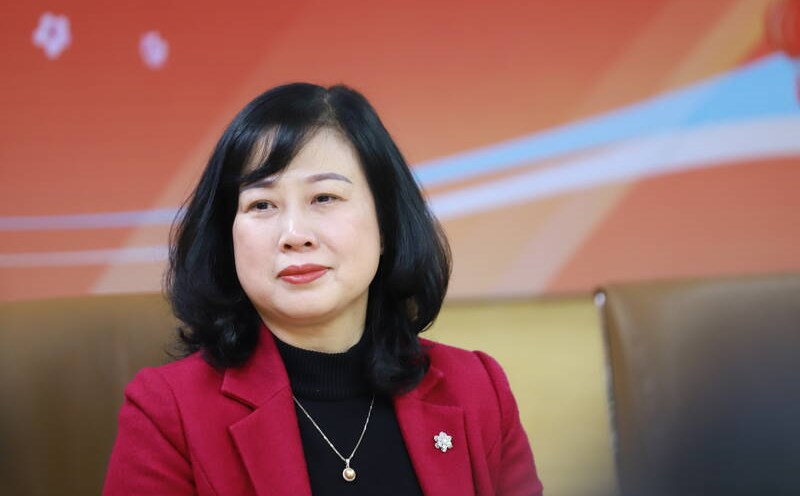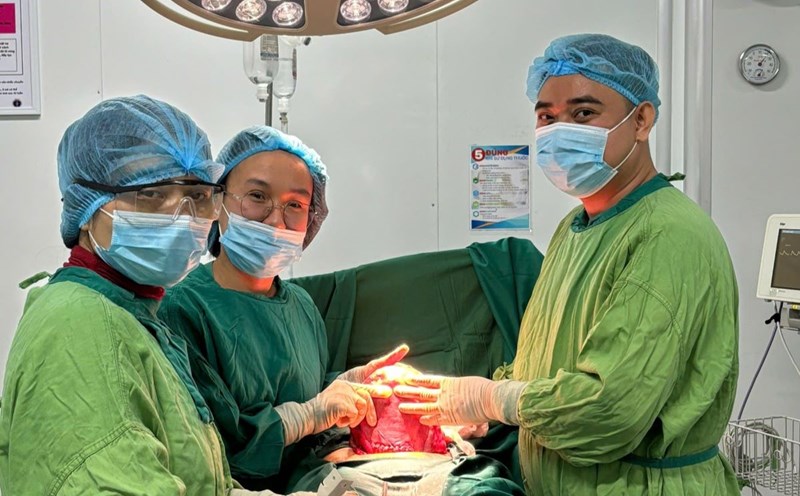Early cancer detection with AI support
A 49-year-old male patient came to Bach Mai Hospital for a general health check-up. Despite having underlying hypertension and having had a heart attack, he had 3 stents. The chest X-ray results showed a blur in the lungs. However, other paraclinical tests such as bronchoscopy did not detect any obvious abnormalities.
In such cases, if the doctor lacks experience or only reads the images poorly, the damage can be missed, causing the patient to lose the opportunity for early diagnosis.
However, thanks to the application of artificial intelligence (AI), the system has automatically analyzed images and detected damage in the right lung involved. AI continued to assess the damage structure and determined that this was a melting note with a high risk of maliciousness, suspected lung cancer.
Sharing about this case, Associate Professor, Dr. Vu Van Giap - Deputy Director of Bach Mai Hospital - said: AI has supported doctors to diagnose this case very effectively. After having the patient have a chest CT scan, the results are pushed to the artificial intelligence server implemented by the research team's software, the machine automatically reads and identifies the lesion analyzed for location, structure and nature of the lesion as an assignment of cloudy clouds with a high risk of lung cancer.
Associate Professor, Dr. Dao Xuan Co - Director of Bach Mai Hospital - puts a lot of effort into this field. Sharing with Lao Dong reporter, Associate Professor Dao Xuan Co said that currently the number of patients visiting the hospital is from 6,000 - 8,000 patients per day, so accurate diagnosis, optimization of work processes, reducing work pressure for medical staff as well as reducing waiting time for patients is the top goal of the hospital.
"The implementation and application of new technologies and techniques will help optimize working processes, increase examination performance for medical staff, and bring many clinical benefits as well as safety for patients" - Associate Professor Dao Xuan Co said.
AI helps save time, reduce the burden on medical human resources
Many central hospitals have applied AI in X-ray, CT, MRI film reading, helping to detect early damage and support doctors in diagnosing faster. Some AI software also supports personalizing cancer treatment regimens based on clinical data.
AI is also integrated into electronic medical records management, reducing administrative burden, optimizing hospital operations and enhancing patient experience. In addition, some hospitals have applied AI in remote medical examination and treatment, contributing to improving the quality of treatment in remote areas.
At Hospital E, the application of AI has shown initial effects in many fields, especially in diagnosis and treatment of diseases. Dr. Nguyen Cong Huu - Director of the hospital - said that currently, the hospital's engineers are researching the application of AI in medical examination and treatment, we hope to be successful because after 3 weeks of research, we have released a demo.
Previously, an ultrasound doctor often needed a secretary to help typing. Now, with the support of AI, doctors can both examine and record results without adding personnel. Similarly, medical examination no longer requires nurses to sit and play with machines like before.
Technology significantly reduces the need for human resources for repetitive tasks. For example, 40 clinics can save 40 support locations. Human resources will be allocated to professional tasks that machines cannot replace.
"The performance is very high, not tiring and there are almost no errors. Especially in the method of surgical methods, the number of votes to return the results to patients, especially in the field of diagnostic imaging. If in the past, to read the results of the imaging diagnosis, the doctor needed hours to research and synthesize, now the doctor has an AI assistant to support, note the results and the doctor only needs to read the final results. Saving a lot of time and human resources" - Dr. Nguyen Cong Huu analyzed.
All treatment decisions must be supervised and confirmed by a doctor
Speaking with Lao Dong, Deputy Minister of Health Nguyen Tri Thuc affirmed: Artificial Intelligence (AI) is only a support tool, it cannot replace doctors. To apply AI in the right direction, the Ministry of Health will complete the legal system, develop regulations on testing, licensing and monitoring of AI quality in medical examination and treatment, ensuring the implementation of only standard systems.
The Ministry will also strengthen the protection of patient data and coordinate with relevant agencies to ensure that AI strictly complies with security regulations, avoiding the disclosure of personal information.
At the same time, the Ministry of Health will issue ethical guidelines, emphasizing that AI only provides professional support. All final treatment decisions must be supervised and confirmed by doctors to ensure the safety and rights of patients.











